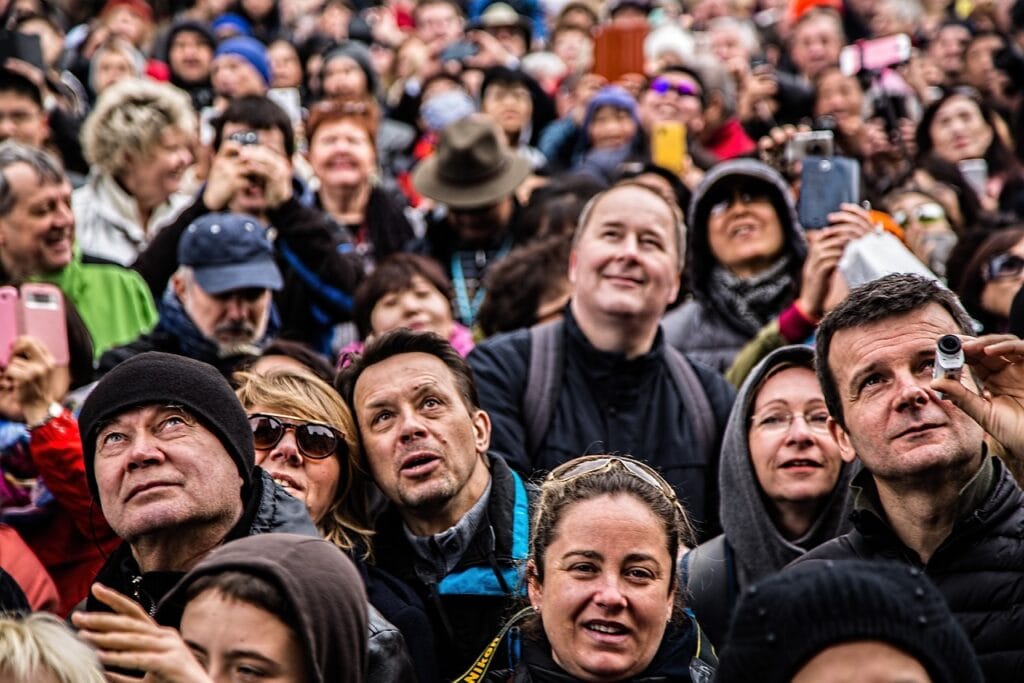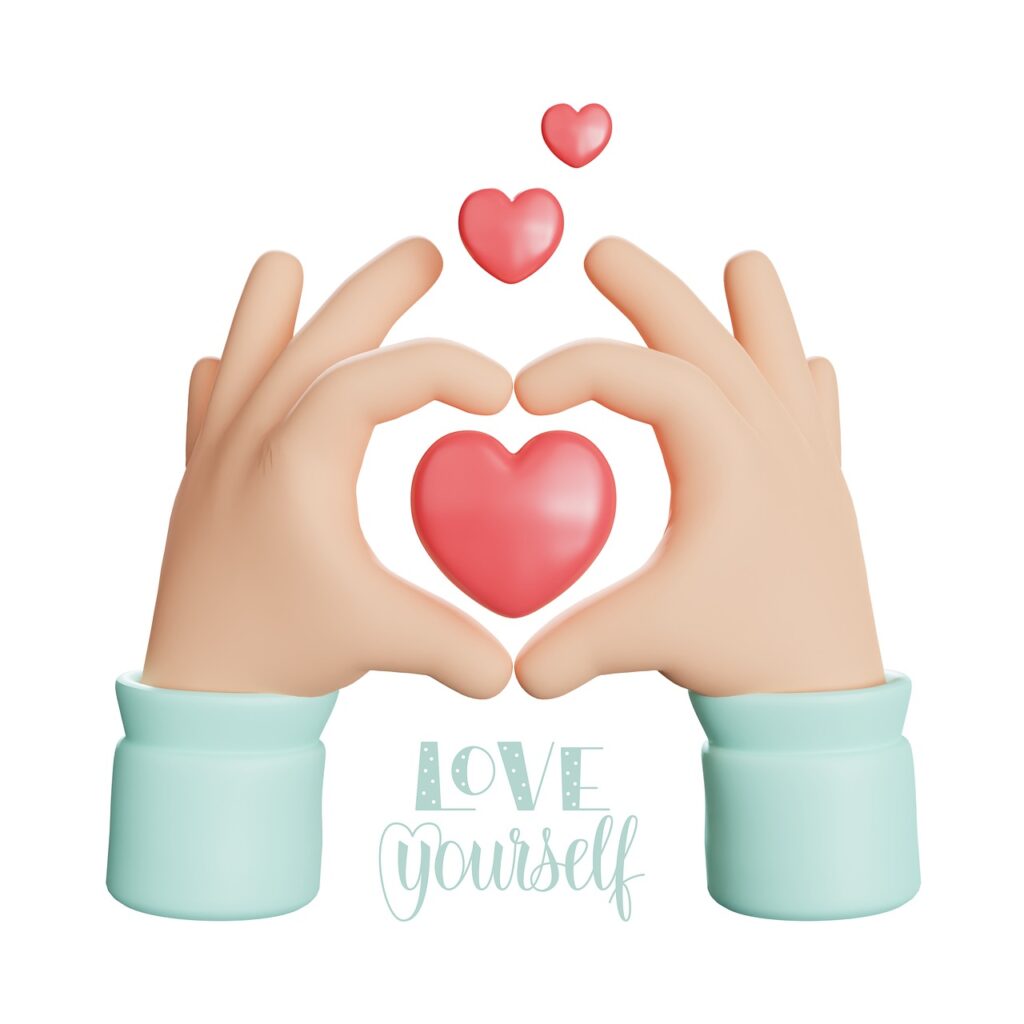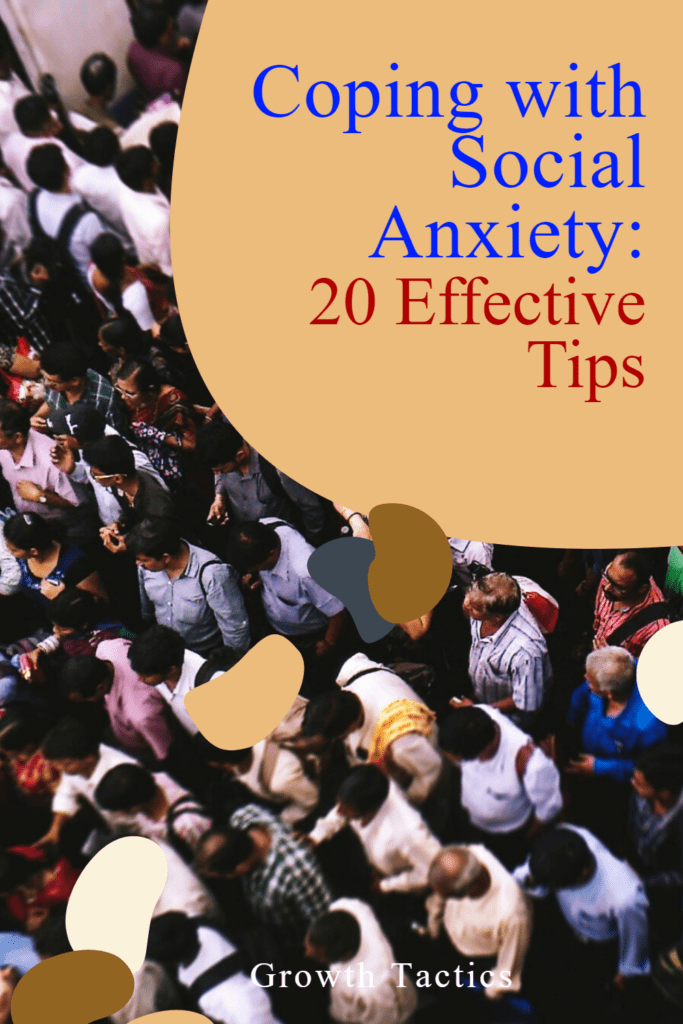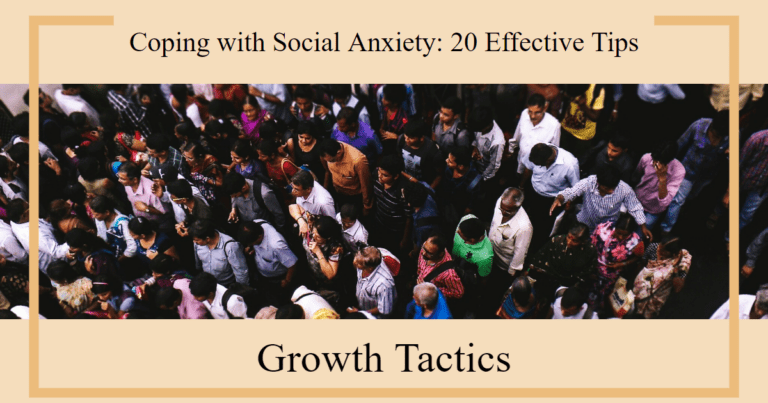Do you ever feel scared in social situations? Maybe your heart races when you have to speak up in a meeting. Or you avoid parties because you’re afraid of what others might think. If this sounds like you, you’re not alone.
Social anxiety can make everyday things feel really hard. It’s more than just being shy. It’s a real fear of being judged or rejected. This fear can be so strong that you might start avoiding social events altogether.
That’s why we’ve put together this list of 20 tips for managing social anxiety.
Jump To Section
What are the Symptoms of Social Anxiety Disorder?

Social anxiety disorder is a mental health condition that can cause significant distress and impairment in social situations. Symptoms of social anxiety disorder can vary from person to person, but some common symptoms include:
- Intense fear or anxiety in social situations where you might be judged or rejected by others
- Avoidance of social situations or extreme discomfort when in social situations
- Physical symptoms like sweating, trembling, or blushing in social situations
- Difficulty speaking or making eye contact with others in social situations
- Fear of being embarrassed or humiliated in social situations
- Excessive worry or rumination about social situations
- Difficulty functioning at work, school, or in other areas of life due to social anxiety
These symptoms can be distressing and can impact on your overall quality of life. If you are experiencing symptoms of social anxiety disorder, it’s important to seek help from a mental health professional. With the right treatment, you can learn to manage your anxiety and live a fulfilling life.
What Causes Social Anxiety Disorder?
Social anxiety is tough. It makes you afraid of social situations. You might worry about talking to new people or being the center of attention. But here’s the thing: you’re not alone. Lots of people deal with this.
Let’s break down what might cause it:
Your Family History
Sometimes, it runs in families. If your parents or siblings have it, you might be more likely to get it too. But remember, your genes aren’t your destiny.
Your Life Experiences
What happens to you matters. Maybe you were bullied as a kid. Or your parents were too strict. These things can shape how you see the world.
Your Brain Chemistry
Your brain is complex. Sometimes, the chemicals in your brain get out of balance. This can lead to anxiety. But don’t worry, our brains can change and adapt.
Your Thinking Patterns
How you think about things is a big deal. If you always expect the worst in social situations, you’re more likely to feel anxious.
Here’s the good news: understanding these causes can help you find solutions. Everyone’s path is different. You have the power to face your fears and grow.
Tips For Managing Social Anxiety

If you are trying to overcome social anxiety, there are many ways to overcome and manage your anxiety. Here are six tips to help you cope with social anxiety:
1. Challenge Negative Thoughts About Social Situations
Negative self-talk can make social anxiety worse. Challenge your negative thoughts by asking yourself questions like, “Is this thought realistic?” or “What evidence do I have to support this thought?” This can help you identify and challenge your negative thoughts.
For example, if you’re worried that people will judge you for saying something stupid, ask yourself if that’s a realistic thought. Have you ever said something stupid before? Chances are, you have, and people didn’t judge you as harshly as you thought they would. By challenging your negative thoughts, you can learn to reframe them in a more positive light.
2. Keep Things in Perspective
Social anxiety can make you feel like everyone is watching and judging you. Try to keep things in perspective by reminding yourself that most people are thinking about themselves, not you. This can help you feel less self-conscious in social situations.
For example, if you’re at a party and you’re feeling anxious, remind yourself that most people are there to have a good time and probably aren’t paying much attention to you. By keeping things in perspective, you can reduce your anxiety and enjoy social situations more.
3. Relaxation Techniques

Relaxation techniques like deep breathing, meditation, and yoga can help counteract the physical symptoms of anxiety, such as sweating and shaking. Try to practice relaxation techniques regularly to help manage your anxiety.
For example, you can practice deep breathing exercises before going into a social situation to help calm your nerves. Or, you can try a yoga class to help reduce overall anxiety levels. By incorporating relaxation techniques into your daily routine, you can learn to manage your anxiety and feel more comfortable in social situations.
4. Challenge Your Avoidance and Social Phobia
Avoiding social situations may make you feel better in the short term, but it can make social anxiety worse in the long term. Work your way up to feared social situations by setting small goals for yourself. This can help you become more confident in social situations.
For example, if you’re afraid of public speaking, start by practicing in front of a small group of friends or family members. As you become more comfortable, gradually work your way up to larger audiences. By challenging your avoidance and social phobia, you can learn to manage your anxiety and feel more confident in social situations.
5. Therapy for Social Anxiety
Cognitive behavioral therapy (CBT) is an evidence-based psychological treatment for social anxiety. CBT can help you challenge negative thoughts and learn coping strategies for social interactions. Consider seeking professional help from a mental health professional if you are struggling to manage your social anxiety. A therapist can work with you to develop a personalized treatment plan that addresses your specific needs and challenges.
In CBT, you’ll work with a therapist to identify negative thought patterns and learn how to challenge and reframe them. You’ll also learn coping strategies for social situations, such as relaxation techniques and exposure therapy. Exposure therapy involves gradually exposing yourself to feared social situations in a safe and controlled environment. With the help of a therapist, you can learn to manage your social anxiety and feel more confident in social situations.
6. Acts of Kindness
Doing acts of kindness for others can help you feel less self-conscious and more connected to others. This can help bring down your anxiety levels in social situations.
For example, you could volunteer at a local charity or simply do something kind for a friend or family member. By focusing on others, you can shift your attention away from your own anxiety and feel more positive about social interactions.
7. Exercise Regularly

Exercise is a great way to reduce anxiety and boost your mood. Regular exercise can help you feel more confident and improve your overall mental health. Whether it’s going for a jog, taking a yoga class, or lifting weights at the gym, find an exercise routine that you enjoy and try to stick to it. Exercise releases endorphins, which are natural mood boosters that can help reduce anxiety and stress.
In addition to the mood-boosting benefits of exercise, it can also help you build confidence in social situations. When you exercise regularly, you may feel more comfortable in your own skin and more confident in social situations. Exercise can also help you improve your physical health, which can have a positive impact on your mental health as well.
8. Practice Mindfulness to Overcome Social Anxiety
Mindfulness is a technique that can help you stay present in the moment and reduce anxiety. By focusing on your breath and paying attention to your thoughts and feelings without judgment, you can learn to manage your anxiety more effectively. Consider taking a mindfulness class or using an app to help you get started. Mindfulness can help you become more aware of your thoughts and feelings, which can help you identify negative thought patterns and challenge them.
In addition to reducing anxiety, mindfulness can also help you feel more connected to others. When you practice mindfulness, you may become more aware of the present moment and more attuned to the needs of others. This can help you build stronger social connections and feel more comfortable in social situations.
9. Use Positive Affirmations
Positive affirmations are statements that you repeat to yourself to help challenge negative self-talk. By focusing on positive thoughts and feelings, you can start to shift your mindset and reduce anxiety. Write down some positive affirmations that resonate with you and repeat them to yourself daily. For example, you might say, “I am capable of handling social situations with ease” or “I am worthy of love and connection.”
Positive affirmations can help you build confidence and self-esteem, which can be beneficial for managing social anxiety disorder. By focusing on positive thoughts and feelings, you can learn to manage your anxiety and feel more confident in social situations. It’s important to note that positive affirmations should be realistic and achievable. By setting realistic goals for yourself and focusing on positive self-talk, you can learn to manage your social anxiety and lead a fulfilling life.
10. Join a Support Group

Joining a support group can help you connect with others who understand what you’re going through. Talking to others who have experienced social anxiety can help you feel less alone and provide you with valuable support and advice. Consider joining an online or in-person support group to help you manage your anxiety.
Support groups can provide a safe and supportive environment where you can share your experiences and feelings with others who understand. In a support group, you can learn coping strategies and get advice from others who have successfully managed their social anxiety. You can also build social connections with others who share your experiences, which can be beneficial for managing social anxiety disorder.
11. Take Small Steps to Get Over Social Anxiety
Taking small steps to challenge your anxiety can help you build confidence and work your way up to more challenging social situations. Start by setting small goals for yourself, such as attending a social event for 30 minutes or striking up a conversation with a stranger. As you become more comfortable, you can gradually increase the difficulty of your goals.
Taking small steps can help you build confidence and reduce anxiety in social situations. By setting achievable goals for yourself, you can gradually work your way up to more challenging social situations. This can help you build confidence and reduce anxiety over time. It’s important to celebrate your successes along the way and acknowledge the progress you’ve made.
12. Use Visualization Techniques
Visualization techniques can help you reduce anxiety by imagining yourself successfully managing social situations. Close your eyes and visualize yourself feeling calm and confident in social situations. This can help you build confidence and reduce anxiety when you’re actually in those situations.
Visualization can be a powerful tool for managing social anxiety disorder. By visualizing yourself successfully managing social situations, you can build confidence and reduce anxiety. Visualization can also help you prepare for social situations by mentally rehearsing how you will handle them. This can help you feel more confident and reduce anxiety when you’re actually in those situations.
13. Get Enough Sleep
Getting enough sleep is essential for managing anxiety and improving your overall mental health. Aim for 7-9 hours of sleep per night and establish a consistent sleep routine to help you get the rest you need.
Getting enough sleep can help you feel more rested and energized, which can be beneficial for managing social anxiety disorder. Lack of sleep can lead to increased anxiety and stress, so it’s important to prioritize sleep as part of your overall self-care routine.
14. Avoid Caffeine and Alcohol
Caffeine and alcohol can worsen anxiety symptoms, so try to avoid them if possible. If you can’t avoid them completely, try to limit your intake and monitor how they affect your anxiety levels.
Caffeine and alcohol can both increase anxiety and make it harder to manage social situations. Caffeine is a stimulant that can increase heart rate and trigger anxiety, while alcohol is a depressant that can interfere with cognitive function and increase anxiety. It’s important to be mindful of how these substances affect your anxiety levels and make adjustments as needed.
15. Practice Self-Care

Practicing self-care is essential for managing social anxiety. Take time for yourself to do things you enjoy, such as reading a book, taking a bath, or going for a walk. This can help you feel more relaxed and reduce anxiety.
Self-care can help you manage stress and anxiety by providing an outlet for relaxation and enjoyment. When you take care of yourself, you may feel more energized and better equipped to handle social situations. It’s important to prioritize self-care as part of your overall mental health routine.
16. Learn Relaxation Techniques
Learning relaxation techniques like progressive muscle relaxation or deep breathing can help you manage anxiety in social situations. Practice these techniques regularly to help you feel more calm and centered.
Relaxation techniques can help you manage anxiety by reducing physical tension and promoting relaxation. Progressive muscle relaxation involves tensing and then relaxing different muscle groups in your body, while deep breathing involves taking slow, deep breaths to calm your body and mind. Practicing these techniques regularly can help you feel more relaxed and reduce anxiety in social situations.
17. Use Humor During Social Interactions
Using humor can help you lighten the mood in social situations and reduce anxiety. Try to find humor in situations and don’t be afraid to laugh at yourself.
Humor can be a powerful tool for managing social anxiety disorder. Laughing can help reduce tension and promote relaxation, which can be beneficial for managing anxiety. Finding humor in situations can also help you feel more comfortable and confident in social situations.
18. Focus on the Present Moment
Focusing on the present moment can help you manage anxiety by reducing worry about the future. Try to stay present in social situations and focus on what’s happening around you.
Focusing on the present moment can help you stay grounded and reduce anxiety in social situations. When you focus on the present moment, you’re less likely to worry about what might happen in the future or dwell on past experiences. This can help you feel more centered and confident in social situations.
19. Challenge Your Assumptions
Challenging any assumptions you have about what other people are thinking or feeling can help you reduce anxiety. Remember that you can’t read minds and that your assumptions may not be accurate.
Social anxiety disorder can cause you to assume that others are judging or evaluating you negatively. These assumptions can increase anxiety and make it harder to engage in social situations. Challenging your assumptions and recognizing that you can’t read minds can help you reduce anxiety and feel more comfortable in social situations. Instead of assuming what others are thinking, try to focus on the present moment and engage in the conversation or activity at hand.
20. Be Kind to Yourself While Trying Different Coping Strategies
Be kind to yourself and remember that social anxiety is a common experience for many people. Don’t beat yourself up for feeling anxious and try to practice self-compassion.
Managing social anxiety disorder can be a challenging process, and it’s important to be kind to yourself along the way. Remember that social anxiety disorder is a common experience and that it’s okay to feel anxious in social situations. Instead of beating yourself up for feeling anxious, try to practice self-compassion and remind yourself that you’re doing the best you can. Be patient with yourself as you try different coping strategies and remember that it takes time to learn new skills and techniques.
Additional Online Resources for Coping with Social Anxiety
In addition to therapy, support groups, and self-help books, there are many online resources available for coping with social anxiety disorder. Here are a few websites to consider:
- Anxiety and Depression Association of America (ADAA): The ADAA is a nonprofit organization that provides information and resources for people with anxiety disorders, including social anxiety disorder. Their website offers articles, self-help tools, and a directory of mental health professionals.
- Social Anxiety Institute: The Social Anxiety Institute is a treatment center that specializes in social anxiety disorder. Their website offers information about the disorder, as well as self-help resources and an online therapy program.
- National Institute of Mental Health (NIMH): The NIMH is a government organization that conducts research on mental health disorders, including social anxiety disorder. Their website offers information about the disorder, as well as resources for finding mental health treatment.
- Social Phobia World: Social Phobia World is an online community for people with social anxiety disorder. Their website offers forums for discussing the disorder, as well as articles and self-help resources.
Remember, while online resources can be helpful, it’s important to seek help from a mental health professional if you’re struggling with social anxiety disorder. With the right treatment and support, you can learn to manage your anxiety and lead a fulfilling life.
Final Thoughts on How to With Social Anxiety
Social anxiety doesn’t have to control your life. By finding ways to overcome and manage your anxiety, you can live with social anxiety and still enjoy social events and interactions. If you need more information on social anxiety disorder and treatment options, check out the resources listed at the bottom of this article.
Did you find this article on coping with social anxiety useful? Don’t forget to share and subscribe.


